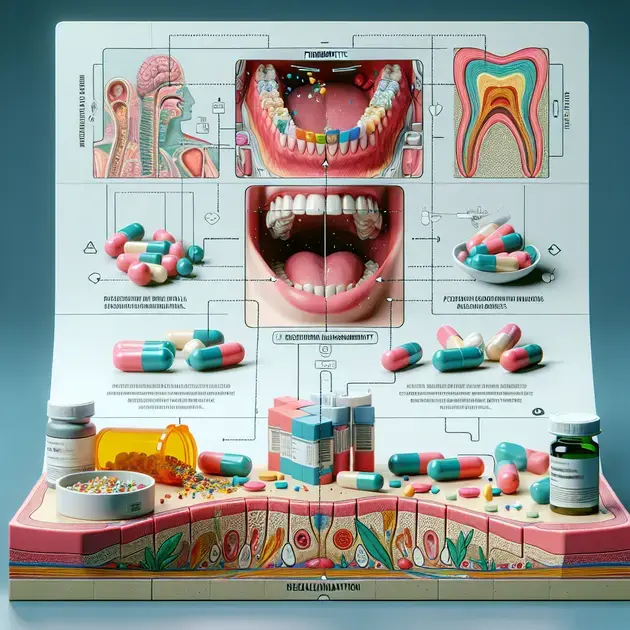When it comes to dealing with periodontitis, understanding the available medications is crucial. Periodontitis medication plays a key role in treating this common inflammatory condition that affects the gums and bone supporting the teeth.
From antibiotics to antiseptic mouth rinses, there are various options available to help manage periodontitis. In this article, we will explore the different types of periodontitis medications, their benefits, and what you need to know to maintain good oral health.

Understanding Periodontitis Medication Options
Periodontitis is a serious gum infection that damages the soft tissue and destroys the bone that supports your teeth. When it comes to treating periodontitis, there are various medication options available that can help in managing the condition. Understanding these medication options is crucial for effectively combating periodontitis.
1. Antibiotics
One common type of medication used in the treatment of periodontitis is antibiotics. Antibiotics can help by targeting and killing the bacteria that cause gum infections. Some commonly prescribed antibiotics for periodontitis include doxycycline, metronidazole, and minocycline. These antibiotics can be taken orally or applied directly to the affected area in the form of mouth rinses or gels.
2. Antiseptic Mouthwashes
Antiseptic mouthwashes are another type of medication that can aid in the treatment of periodontitis. These mouthwashes contain active ingredients like chlorhexidine that help in reducing plaque and preventing bacterial growth in the mouth. Using antiseptic mouthwashes as part of your oral hygiene routine can help in controlling the progression of periodontitis.
3. Enzyme Suppressants
Enzyme suppressants are medications that work by inhibiting the enzymes responsible for breaking down gum tissue. By slowing down this process, enzyme suppressants can help in preventing further damage to the gums and supporting structures. Some examples of enzyme suppressants used in periodontitis treatment include doxycycline, tetracycline, and non-steroidal anti-inflammatory drugs (NSAIDs).
4. Prescription Strength Toothpaste
Prescription strength toothpaste containing special ingredients like fluoride, triclosan, and zinc citrate can also be beneficial in managing periodontitis. These toothpastes are designed to help in reducing plaque buildup, fighting bacteria, and promoting gum health. Using prescription strength toothpaste as recommended by your dentist can complement your periodontal treatment.
5. Oral Pain Relievers
In cases where periodontitis causes pain and discomfort, oral pain relievers can provide temporary relief. Over-the-counter medications like ibuprofen or acetaminophen can help in alleviating pain and reducing inflammation associated with periodontal infections. However, it is essential to consult with your healthcare provider before taking any medication to ensure safety and effectiveness.
Types of Medications for Periodontitis Treatment
When it comes to treating periodontitis, there are several types of medications that can be used to manage the condition effectively. Understanding the different medication options available can help in developing a comprehensive treatment plan for periodontitis.
1. Antibiotics
Antibiotics are a common type of medication used in the treatment of periodontitis. They work by targeting and killing the bacteria that cause gum infections. Commonly prescribed antibiotics for periodontitis include doxycycline, metronidazole, and amoxicillin. These antibiotics can be taken orally or applied directly to the affected area for localized treatment.
2. Antimicrobial Mouthwashes
Antimicrobial mouthwashes containing ingredients like chlorhexidine or cetylpyridinium chloride can help in reducing bacteria in the mouth and controlling plaque buildup. Using antimicrobial mouthwashes as part of your daily oral hygiene routine can aid in preventing the progression of periodontitis and promoting gum health.
3. Enzyme Inhibitors
Enzyme inhibitors are medications that target the enzymes responsible for breaking down gum tissue. By inhibiting these enzymes, enzyme inhibitors can help in slowing down the progression of periodontitis and preserving the health of the gums. Some examples of enzyme inhibitors used in periodontitis treatment include low-dose doxycycline and other matrix metalloproteinase (MMP) inhibitors.
4. Topical Gels and Creams
Topical gels and creams containing antibiotics or antimicrobial agents can be applied directly to the gums to provide localized treatment for periodontitis. These topical medications can help in reducing inflammation, controlling bacterial growth, and promoting healing in the affected areas. Your dentist may recommend specific topical gels or creams based on your individual condition.
5. Pain Relief Medications
If you experience pain or discomfort due to periodontitis, pain relief medications can help in managing your symptoms. Over-the-counter pain relievers like ibuprofen or aspirin can provide temporary relief from pain and inflammation. However, it is important to consult with your dentist or healthcare provider before taking any pain relief medications to ensure they are safe and suitable for your condition.

Understanding Periodontitis Medication: What You Need to Know
Periodontitis medication plays a crucial role in managing and treating this serious gum infection. Understanding the various medications available is essential for effective treatment. The most common types of medications for treating periodontitis include antibiotics, antimicrobials, and prescription mouthwashes.
Antibiotics are often prescribed to control bacterial infections in the gums. They can be taken orally or applied directly to the gums in the form of a gel. Antimicrobials, on the other hand, target specific bacteria that cause gum disease. They are available in the form of chips that are placed in the pockets of the gums where bacteria thrive.
Prescription mouthwashes containing antibacterial agents are another common type of medication used to treat periodontitis. These mouthwashes help reduce bacteria in the mouth, promoting healthier gums and preventing further infection. It’s important to use these mouthwashes as directed by your dentist for optimal results.
When taking periodontitis medication, it’s important to follow your dentist’s instructions carefully. Make sure to complete the full course of antibiotics or other medications as prescribed, even if your symptoms improve before the medication is finished. This will help prevent the infection from returning.
In addition to medication, maintaining good oral hygiene practices is key to managing periodontitis. Regularly brushing and flossing, along with routine dental cleanings, can help prevent the progression of gum disease. Working closely with your dentist to develop a personalized treatment plan will ensure the best outcomes for your oral health.
Tips for Effective Oral Health Management with Periodontitis Medication
When using medication to manage periodontitis, there are several tips to keep in mind for effective oral health care. First and foremost, always follow your dentist’s instructions regarding medication dosage and frequency. Consistency is key to managing the infection and preventing its recurrence.
Alongside medication, maintaining a healthy lifestyle can greatly impact the effectiveness of treatment. Eating a balanced diet rich in vitamins and minerals can help support your immune system and promote gum health. Avoiding tobacco products and limiting sugary foods and drinks can also improve outcomes.
Regular dental check-ups are essential when managing periodontitis with medication. Your dentist can monitor your progress, adjust your treatment plan as needed, and provide professional cleanings to remove plaque and tartar buildup. Early detection of any changes in your gum health is crucial for successful treatment.
Incorporating good oral hygiene habits into your daily routine is vital for managing periodontitis. Brushing twice a day with a fluoride toothpaste, flossing daily, and using an antiseptic mouthwash can help control bacteria in the mouth and prevent further infection. Be gentle when brushing to avoid irritating the gums.
It’s important to be patient and persistent when using medication to treat periodontitis. Improvement may not happen overnight, but with consistent care and follow-up appointments with your dentist, you can effectively manage the infection and maintain a healthy smile. Remember that proper oral health care is a lifelong commitment.
Conclusion
In conclusion, understanding periodontitis medication is vital for effectively managing and treating this serious gum infection. Antibiotics, antimicrobials, and prescription mouthwashes are common medications used for periodontitis treatment. Antibiotics help control bacterial infections, while antimicrobials target specific bacteria in gum disease. Prescription mouthwashes containing antibacterial agents play a crucial role in promoting healthier gums.
Following your dentist’s instructions carefully when taking periodontitis medication is essential. Completing the full course of antibiotics, maintaining good oral hygiene practices, and working with your dentist to develop a personalized treatment plan are key for successful outcomes in managing gum disease. Consistency in medication, routine dental check-ups, and incorporating good oral hygiene habits into your daily routine are crucial for preventing recurrence.
Additionally, alongside medication, maintaining a healthy lifestyle through a balanced diet, avoiding tobacco products, and limiting sugary foods can greatly impact the effectiveness of treatment. Regular dental check-ups allow for monitoring progress, adjusting treatment plans, and early detection of any changes in gum health for successful management of periodontitis. Remember, patience and persistence are essential when using medication to treat periodontitis, with proper oral health care being a lifelong commitment for a healthy smile.



